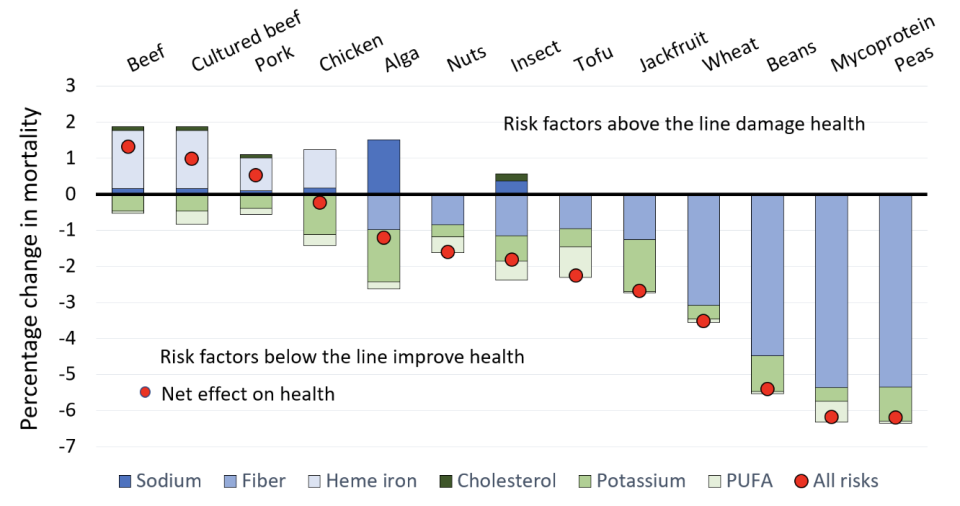The radical global blueprint to cut deaths and emissions by moving away from meat

Moving away from meat to alternative sources of protein would “drastically” reduce greenhouse gas emissions as well as prevent millions of unnecessary deaths annually.
In a new report ‘Alternative Proteins,’ conducted by Oxford University’s Oxford Martin School for the World Economic Forum (WEF), a combination of innovative protein sources, improved production systems, and changed consumer behaviour will be able to sate the growing global population demand. Furthermore, it will be more sustainable for the environment and will also make the future world population healthier.
“Alternative proteins that can act as substitutes for traditional animal‑based food are attracting considerable financial investment, research attention and interest in the media as a pathway to meeting the nutritional needs and food demands of a predicted mid‑century population of 10 billion, in a healthy and sustainable manner,” said H Charles J Godfray, professor of zoology at Jesus College, Oxford, and director of the Oxford Martin Programme on the Future of Food at Oxford University.
“An important finding of this research is that showing the benefits of these products is not sufficient for consumers to adopt them. A much wider set of interventions will be required to accelerate uptake,” he added.
The impact of meat production on emissions and health
Beef has been a huge issue for the environment, with the production of the meat being responsible for 25% of all food-related greenhouse gas emissions according to data from 2010. The report points out that as the global population grows, and if the production of the meat moves in tandem, it places even greater pressure on the environment.
“It will be impossible to sustainably satisfy the world’s future demand for meat. What this report shows is that it can be possible to produce enough nutrition for 10 billion people and improve people’s health without necessarily giving up meat – even red meat – altogether, through innovation in products, improvements in how we produce beef, pork, and chicken, and an effort on the part of the consumer to embrace a more diverse diet,” said Dominic Waughray, managing director at WEF.
Compare the emissions intensity of beef, which is 23.9 kilograms of CO2 equivalent per 200kcal, with that of alternative proteins — such as beans, insects, wheat and nuts, which only emit 1kg or less CO2 equivalent for the same nutritional value. Other sources such as tofu, pork, alga and chicken produce only 3-6 kilograms CO2 equivalent, points out the report.

Moreover, when it comes to health, the report highlights how moving more of the population to sustainable alternatives can “reduce the overall global burden of diet-related deaths by 2.4%, with that number climbing to 5% for people in high- and upper-middle-income countries.”
Risk factors include serum cholesterol levels associated with dietary fatty acid composition as well as high blood pressure associated with sodium intake. There is also evidence that increased consumption of animal‑derived foods rich in heme iron is associated with increased coronary heart disease and stroke risk, cites the report.

More importantly, Oxford University and WEF emphasise that these findings are not enough to change society’s approach to meat, and that greater understanding on the costs of transitioning away from traditional animal‑based products in more developed countries as well as support from government and regulators are essential to provide meaningful change.
“Meat has a special place in human diets. Modern human beings have an innate preference for meat as it is both energy‑dense and protein‑rich and we evolved in an environment where energy and protein were scarce,” said the report. “Meat has important social as well as nutritional functions, and in many societies the consumption and provision of certain types of meat signals status or hospitality. These strong cultural and biological drivers have a significant effect on efforts to change diets, as we have seen over time in relation to many public health campaigns designed to promote healthier consumption.
“This analysis is intended to facilitate further debate and dialogue between stakeholders, and to identify areas of opportunity and critical intervention points. It seeks to encourage a step‑change in progress, in particular by harnessing the transformational possibilities of the Fourth Industrial Revolution. It argues for a systemic, multi-stakeholder approach – the building of new platforms of action to accelerate and scale this new protein economy – in order to help create the future we want and need.”

